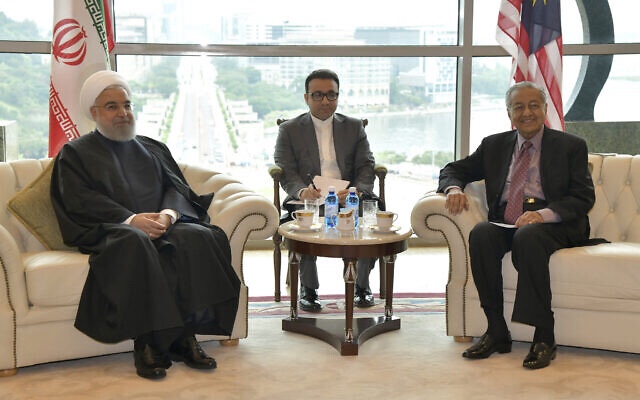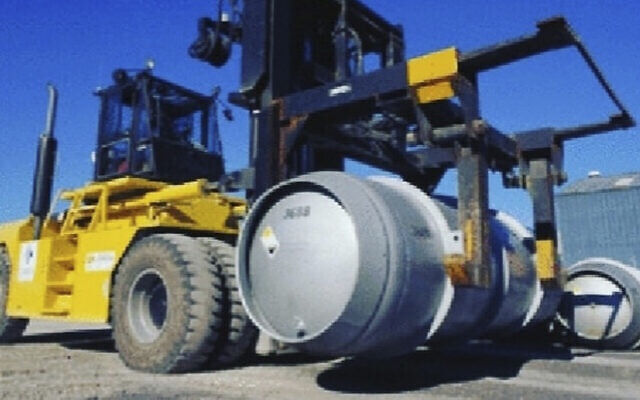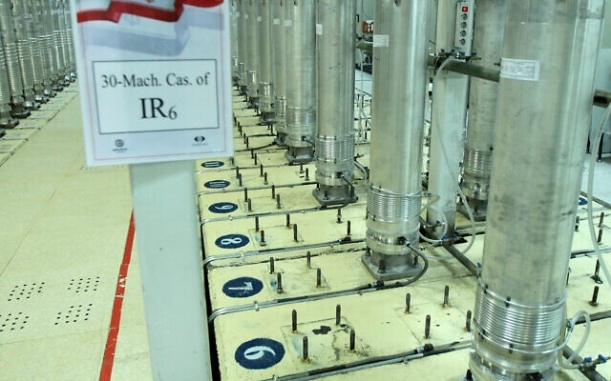President Rouhani also confirms Tehran already running more advanced models to step up enrichment, in violation of 2015 pact
By TOI staff18 Dec 2019, 6:13 pm
Iranian President Hassan Rouhani on Wednesday said his country has begun testing its latest, much faster, model of centrifuges in a further signal the international deal limiting its nuclear program was unraveling.
“Today, our new IR-6 centrifuges are working and the newer IR-9’s are being tested,” he said during a visit to Malaysia, according to a statement on his website.
According to Iranian officials, an IR-6 centrifuge can produce enriched uranium 10 times faster than the country’s first-generation IR-1 centrifuges.
Get The Times of Israel’s Daily Edition by email and never miss our top stories Free Sign Up
The IR-9, for its part, works five times faster than the IR-6 and 50 times faster than the IR-1, the head of the Atomic Energy Organization of Iran, Ali Akbar Salehi, has said.
A centrifuge enriches uranium by rapidly spinning uranium hexafluoride gas, with more advanced centrifuges further cutting into the one year that experts estimate Tehran would need to have enough material for building a nuclear weapon — if it chose to pursue one.
Iran has ramped up its nuclear activities since US President Donald Trump unilaterally pulled the US out of the 2015 nuclear deal last year. The deal, negotiated between Tehran and world powers under the previous US administration of Barack Obama, was designed to see Iran curb its nuclear program in exchange for the lifting of powerful sanctions. The US has since reinstated punitive measures on Iran which have affected its struggling economy.

In this photo released by Malaysia’s Department of Information, Malaysia’s Prime Minister Mahathir Mohamad, right, and Iran’s President Hassan Rouhani, pose for a photo ahead of their meeting in Putrajaya, Malaysia, December 18, 2019. (Malaysia’s Department of Information via AP)
“Today, the entire world know[s] that the US’ withdrawal from the JCPOA was no[t] to the benefit of anyone, even themselves and their friends,” Rouhani said Wednesday, using the initials for the 2015 deal’s official name.
He denounced the US reimposition of sanctions as an “illegal move” and said he did not believe they could continue.
“Americans have no choice but to return from this path, and we will force them to do so with our resistance and steadfastness,” he said.
In response to the US sanctions, Iran in recent months has been breaching the conditions of the 2015 pact by increasing its stockpiles of enriched uranium and stepping up its enrichment capacity.
Last month, the International Atomic Energy Agency (IAEA) confirmed that Iran had breached another limit in its nuclear deal by stockpiling more heavy water than the accord allowed.
Tehran has indicated that it has taken several steps away from the accord. It now enriches uranium up to 4.5%, beyond the 3.67% allowed by the deal. Iranian officials say their stockpile of low-enriched uranium is over 500 kilograms (1,100 pounds), above the accord’s 300-kilogram (661-pound) limit. It has also begun using advanced centrifuges prohibited by the agreement and resumed enrichment at its underground Fordo facility.

In this photo released by the Atomic Energy Organization of Iran on November 6, 2019, a forklift carries a cylinder containing uranium hexafluoride gas for the purpose of injecting the gas into centrifuges in Iran’s Fordo nuclear facility. (Atomic Energy Organization of Iran via AP)
Tehran’s violations — all announced in advance and verified by International Atomic Energy Agency inspectors — have been an attempt to pressure the other world powers involved, France, Germany, Britain, China and Russia, to offer new economic incentives to offset the effect of the American sanctions.
Iran has previously suggested it would walk back those activities if it receives the economic incentives it needs.
Also Wednesday, Rouhani accused the US and Israel of seeking to fuel domestic unrest in Iran, following recent protests in which rights groups said hundreds were killed in the government crackdown.
“The goal that the Americans and Zionists were pursuing by sanctions and putting maximum pressure on Iran was to push us into isolation, and incentivize the Iranian nation to rise against the state,” he said. “Despite what they thought, the Iranian nation resisted in spite of having hard living conditions because of unjust sanctions.”
Agencies contributed to this report.
No comments:
Post a Comment